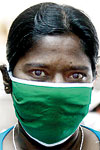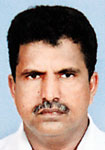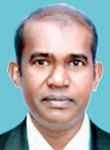It’s exactly a month after H.G. Dhammika Damayanthi underwent kidney transplantation after 174 times of dialyses since she was diagnosed with chronic kidney failure in 2009.
This 43-year-old mother of one was fortunate, for after many futile attempts to get a donor, she became one of the recipients in the first recorded ‘Paired Donor Exchange’, a unique programme tried at the Nephrology and Kidney Transplant Unit of the Kandy Teaching Hospital under Surgeon-in-Charge Dr. P.K. Harischandra and his team of doctors, nurses and other staff, the Sunday Times learns.
 |
 |
Damayanthi: Eyes
full of hope |
Her husband Upali |
The double transplants involving four patients was done side-by-side simultaneously, explains Medical Officer Dr. Buddhi Sumithraarachchi, who took time off his busy schedule of seeing patients to talk to the Sunday Times in the absence of Dr. Harischandra who was abroad last Wednesday.
Lasting a strenuous six hours, with two surgical teams working in tandem, the patients were anaesthetized at the same time, so that even at the last minute if they didn’t want to undergo surgery they could have pulled out, Dr. Sumithraarachchi stressed.
The Paired Donor Exchange Programme could very well be the answer to the frantic and sometimes futile search by desperate victims of chronic kidney failure to find a donor with a matching kidney.
Delving into the medical nitty-gritty of donors and recipients, Dr. Sumithraarachchi says that a donor with the ‘O’ blood group can donate to recipients with any one of the four blood groups of ‘A’, ‘B’, ‘AB’ or ‘O’. However those with ‘A’ can donate only to recipients with ‘A’ or ‘AB’ and those with ‘B’ can donate only to recipients with ‘B’ or ‘AB’ blood. Donors who have ‘AB’ can donate only to recipients who have ‘AB’ blood.
With many patients suffering from kidney disease streaming into the unit and seeing their desperation and hopelessness in securing a “matching” donor, the doctors encourage patients to talk to each other and come to an independent decision, it is learnt.
Here were two couples, one from Ampara and the other from Kandy – Damayanthi and R.G. Upali Senanayake and G.G. Gunasena and G.G.D. Shanthani respectively. Both Damayanthi and Gunasena needed urgent kidney transplants and though their spouses were more than willing to donate their kidneys those simply didn’t match their partners’ blood groups.
It was then that the doctors suggested the Paired Donor Exchange Programme under which Damayanthi could get the kidney willingly donated by Shanthani and vice versa, with Upali’s kidney being given to Gunasena.
 |
 |
| The couple from Kandy: G.G. Gunasena, who needed a transplant and his wife Shanthani |
Eyes full of hope, above the mask on her face to prevent catching an infection, Damayanthi’s voice is tremulous as she compares the doctors to “devivaru” (gods), while also grateful to all her relatives and neighbours back in Ampara who did what they could for her to overcome her illness.
Wetilama hitiye, salli thibbe ne, she sighs, explaining that they were down in the depths of despair and didn’t have any money for all the travel and hospital visits. Deke kanuwe hamuduruwo godak udaw kara (The monk at the second milepost helped a lot).
Her thoughts quickly revert to her beloved husband who has sacrificed much. “Goda gaththa,” says Damayanthi reliving the latter stages before the transplant when her body including her stomach had been heavily bloated and her skin had become very dark.
With that exchange on September 8, kidney donations and transplantations step into a new era, as the Paired Donor Exchange Programme can save numerous people from the brink of death.
Music guru on the road to recovery
Well-known music guru, Ananda Perera has undergone a transplant on September 15, having been donated a kidney by the mother of one of his students.
”After the surgery, I was in the Intensive Care Unit for two days and in the ward for another three days before being discharged from hospital,” says Mr. Perera who lives in Kandy. Now he needs to attend the clinic once every three days for a month after the operation, then once a week for another month and after that once a fortnight in the third month.
“Thereafter, I will have to come to the clinic once a month for the rest of my life,” he says, adding that he has been advised not to go to crowded places for at least six years, as his immunity is down.
Mr. Perera, who explains that there is a slight irritation in his throat due to a tube being put down his throat, hopes to reasume
teaching soon. |





